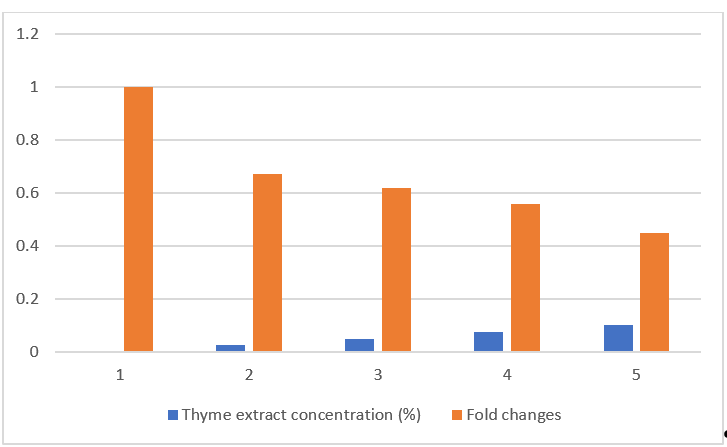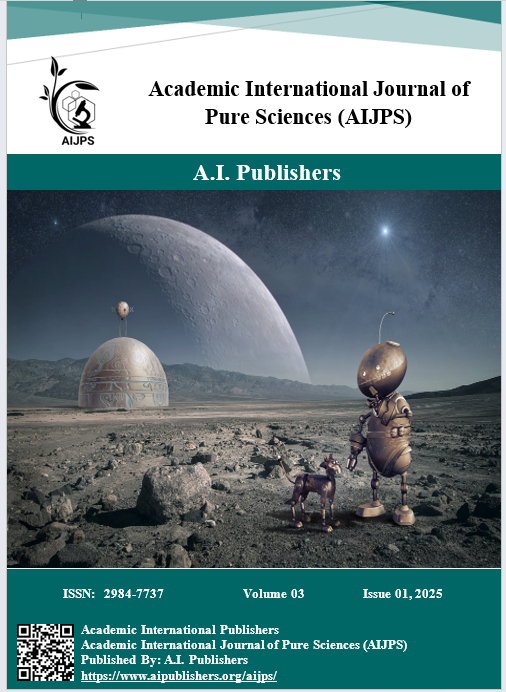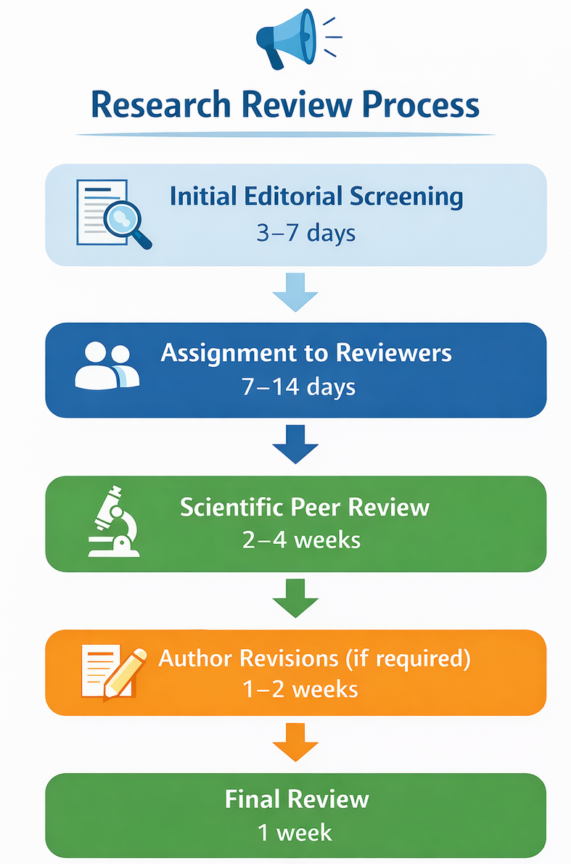Evaluating The Effect of Thyme Extract on Inhibiting Gene Expression of Virulence Factors in Acinetobacter Baumannii and Studying Its Effect on Biofilm Formation
DOI:
https://doi.org/10.59675/P226Keywords:
Thyme Extract, Gene Expression, Acinetobacter BaumanniiAbstract
Because of the resistance of this bacteria to many antibiotics, it has become necessary to find alternatives to antibiotics or materials that work synergistically with antibiotics in order to control and inhibit the growth of this bacteria, which poses a great danger to patients with burns and wounds. Therefore, it has been proposed that this plant extract be used to prove its effectiveness. Grind the dried thyme leaves to obtain a fine powder. Place 10 grams of thyme powder in a beaker containing 100 ml of distilled water (10% w/v concentration). Heat the mixture in a water bath at 60-70°C for 30-60 minutes with continuous stirring. After heating is complete, let the mixture cool to room temperature. Filter the extract using filter paper or a fine strainer to obtain the pure extract. To prepare several concentrations of the aqueous extract, dilute the basic extract (10%) to the desired concentrations, such as 2.5%, 5%, and 7.5%. Use the following equation to determine the volume of the aqueous extract and the volume of distilled water required for each concentration: C1×V1=C2×V2C1 \times V1 = C2 \times V2C1. Effect of different concentrations of thyme extract (2.5, 5%, 7.5, and 10), where a significant effect of this plant was observed in inhibiting the biofilms of these bacteria, and the concentration of 7.5 and 10 gave the best results in inhibiting the biofilm of these bacteria. The mechanism of inhibition can be explained by the fact that thyme contains active compounds such as thymol and carvacrol, which have antibacterial properties.
References
HASSANNEJAD, Niloofar, et al. In vivo antibacterial activity of Zataria multiflora Boiss extract and its components, carvacrol, and thymol, against colistin‐resistant Acinetobacter baumannii in a pneumonic BALB/c mouse model. Journal of Cellular Biochemistry, 2019, 120.11: 18640-18649. DOI: https://doi.org/10.1002/jcb.28908
BAKHTIARI, Saghar, et al. Investigating the effects of Zataria Multiflora essential oil and silver nanoparticles on the expression of abaI and pil genes in Acinetobacter baumannii biofilm formation. Health Biotechnology and Biopharma (HBB), 2024, 7.4: 63-80.
NOORBAKHSH, Fatemeh; RAHMATI, Parisa. Effects of Thymus vulgaris and Cinnamomum verum Essential Oils on bap and ica Gene Expression in Staphylococcus aureus. Archives of Clinical Infectious Diseases, 2022, 17.2. DOI: https://doi.org/10.5812/archcid-122410
COȘERIU, Răzvan Lucian, et al. Antibacterial effect of 16 essential oils and modulation of mex efflux pumps gene expression on multidrug-resistant Pseudomonas aeruginosa clinical isolates: is cinnamon a good fighter?. Antibiotics, 2023, 12.1: 163. DOI: https://doi.org/10.3390/antibiotics12010163
SKARIYACHAN, Sinosh, et al. Recent perspectives on the virulent factors and treatment options for multidrug-resistant Acinetobacter baumannii. Critical reviews in microbiology, 2019, 45.3: 315-333. DOI: https://doi.org/10.1080/1040841X.2019.1600472
NEDELJKOVIĆ, Snežana Kuzmanović, et al. Microencapsulation of Origanum heracleoticum L. and Thymus vulgaris L. essential oils–Novel strategy to combat multi-resistant Acinetobacter baumannii. Industrial Crops and Products, 2024, 216: 118762. DOI: https://doi.org/10.1016/j.indcrop.2024.118762
ANEES, Mohammed; DEEKSHIT, Vijaya Kumar; SHETTY, A. Veena. In-vitro effectiveness of essential oils against isolated Klebsiella pneumoniae and Acinetobacter baumannii: A narrative review. Biomedicine, 2022, 42.6: 1128-1137. DOI: https://doi.org/10.51248/.v42i6.1977
TAPIA-RODRIGUEZ, Melvin Roberto, et al. Inhibition of Acinetobacter baumannii biofilm formation by terpenes from Oregano (Lippia graveolens) essential oil. Antibiotics, 2023, 12.10: 1539. DOI: https://doi.org/10.3390/antibiotics12101539
EL-DEMERDASH, Azza SalahEldin, et al. Essential oils as capsule disruptors: enhancing antibiotic efficacy against multidrug-resistant Klebsiella pneumoniae. Frontiers in Microbiology, 2024, 15: 1467460. DOI: https://doi.org/10.3389/fmicb.2024.1467460
MESKINI, Maryam; ESMAEILI, Davoud. The study of formulated Zoush ointment against wound infection and gene expression of virulence factors Pseudomonas aeruginosa. BMC complementary and alternative medicine, 2018, 18: 1-10. DOI: https://doi.org/10.1186/s12906-018-2251-4
HAMAD, Mohammed A.; HUSSEIN, Najeeb Mohammed; ALJUMAILI, Omar I. Study of Humeral Immune Response and Some of the Blood Variables in Mice Balb/c Treated with LPS of Klebsiella pneumoniae Antigen and Glycyrrhiza glabra Extract. EXECUTIVE EDITOR, 2019, 10.2: 445. DOI: https://doi.org/10.5958/0976-5506.2019.00331.0
HUSSEIN, Najeeb Mohammed; OWAID, Mustafa Nadhim; KHALAF, Ban Hamid. Effects of Lipopolysaccharides of Pseudomonas Aeruginosa and Aqueous Extract of Ginkgo Biloba, Ginkgoaceae, on Cellular Immune Response in Mice Balb/c. Gazi Medical Journal, 2018, 29.3. DOI: https://doi.org/10.12996/gmj.2018.57
ABDULLAH, Qasim Khlaif, et al. Effect of celiac disease on humoral immune response and some of the blood variables in children. In: AIP Conference Proceedings. AIP Publishing, 2020. DOI: https://doi.org/10.1063/5.0000081
SHARAD, Ali Abd; ALMUHARIB, Omar; HUSSEIN, Najeeb Mohammed. Effect of Xanthium Strumarium Extract on SomeVirulenceFactor of Proteus Mirabilis Isolated fromPatients inRamadiHospital. Systematic Reviews in Pharmacy, 2020, 11.9.
MUSA, Farkad Hawas, et al. Effect of some plant extracts on the Pyocyanin Production from Pseudomonas Aeruginosa which Isolated from clinical samples. In: IOP Conference Series: Materials Science and Engineering. IOP Publishing, 2020. p. 012041. DOI: https://doi.org/10.1088/1757-899X/870/1/012041

Downloads
Published
Issue
Section
License
Copyright (c) 2024 Academic International Journal of Pure Science

This work is licensed under a Creative Commons Attribution 4.0 International License.








